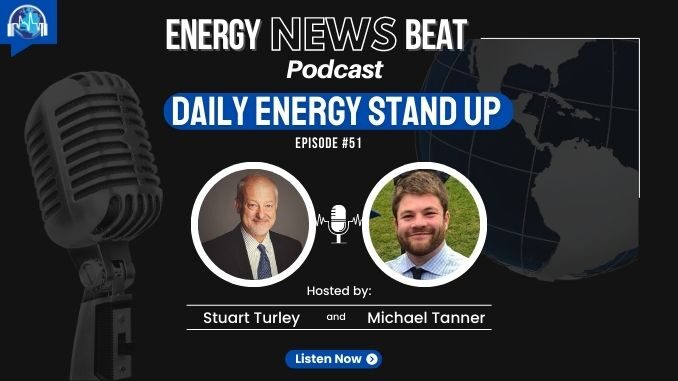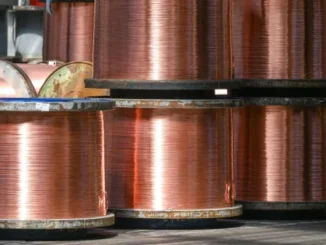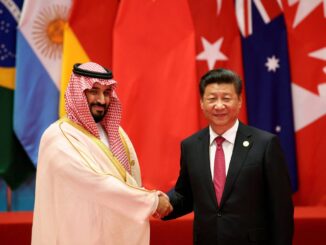
Top Stories of the week
How does Norway export its natural gas? But more importantly; to who?
OSLO, March 17 (Reuters) – Norway exported more than 120 billion cubic metres (bcm) of gas in 2022, mainly via pipelines, making it Europe’s largest gas supplier following a drop in Russian flows last year. […]
UBS Agrees to Buy Rival Credit Suisse
By Andrew Ross Sorkin, Michael J. de la Merced and Maureen Farrell Andrew Ross Sorkin, Michael de la Merced and Maureen Farrell cover global finance from New York and London. UBS has agreed to buy Credit Suisse, its beleaguered […]
Despite liberal media wishful thinking, China just keeps pumping out more carbon dioxide
If you want to see unshakable hope in the face of all evidence, check out the Americans and Brits who consistently promise that China is going green. One of the most predictable patterns of the past 20 […]
Report: Nearly Half of ‘Climate Change’ Companies in U.S. Banked with Failed SVB
Half of the companies in the U.S. devoted to climate change and biotech banked with the now-failed Silicon Valley Bank (SVB), leaving many of those companies looking for financial backers willing to take on the […]
Bank Turmoil Could Undermine The Effect Of Biden’s Clean Energy Bill
After the collapse of Silicon Valley Bank and Signature Bank, U.S. clean energy start-ups and companies could face growing difficulties in accessing finance, which could slow the effect of a rapid renewable energy rollout intended […]
Putin And Xi Jinping Sign String Of Strategic Agreements
Xi Jinping concluded a three-day visit to Russia on March 21. He and Russian President Vladimir Putin inked several agreements to deepen strategic cooperation between the two countries. Xi said the agreement brings ties into a “new […]
Putin To Xi: “We Support Chinese Yuan Use With Asia, Africa, Latin America”
In a ceremony at the Kremlin, and on the second day of Chinese leader’s Xi Jinping’s visit, Putin and Xi kicked off formal talks which will focus on the Ukraine crisis. They shook hands and […]
Highlights of the Podcast
00:00 – Intro
01:04 – How does Norway export its natural gas? But more importantly; to who?
03:18 – UBS Agrees to Buy Rival Credit Suisse
05:49 – Despite liberal media wishful thinking, China just keeps pumping out more carbon dioxide
08:19 – Report: Nearly Half of ‘Climate Change’ Companies in U.S. Banked with Failed SVB
09:36 – Bank Turmoil Could Undermine The Effect Of Biden’s Clean Energy Bill
12:43 – Putin To Xi: “We Support Chinese Yuan Use With Asia, Africa, Latin America”
15:23 – Putin And Xi Jinping Sign String Of Strategic Agreements
17:55 – Outro
Follow Stuart On LinkedIn and Twitter
Follow Michael On LinkedIn and Twitter
Video Transcription edited for grammar. We disavow any errors unless they make us look better or smarter.
Michael Tanner: [00:00:14] What’s going on. Everybody, welcome into a special edition of the Daily Energy News Beat Stand Up here on this gorgeous Friday, March 24th, 2023. We appreciate you guys sticking with us through this long week. [00:00:25][10.7]
Michael Tanner: [00:00:25] We are bringing you the top segments from this week. We’ve got some great ones lined up and we’re going to be talking SVB in the bank collapse. You know, we’re going to be talking supply demand and specifically what’s going on in the oil markets. So down further, you I’m going to go ahead and kick it over and let you do this. [00:00:38][13.3]
Michael Tanner: [00:00:38] But guys, remember all the stories you’re about to hear courtesy of the world’s greatest website, www.EnergyNewsBeat.com check out the links in all the stories below. We appreciate you guys hitting our website. [00:00:47][8.5]
Michael Tanner: [00:00:47] We just had our best month last month. I’m looking at the numbers. If March if they hold out will be are by far our best month. And that goes back to you guys. We appreciate you guys. Checking us out. I’ll let you get to the show, though, guys. We’ll talk more Monday. See you tomorrow. [00:00:59][11.4]
Stuart Turley: [00:00:59] I’ll tell you what, I love Norway. And let’s start at Norway as we go across the pond, How does Norway export its natural gas? But more importantly, to who or to whom, depending of my aunt is talking to us. [00:01:13][14.1]
Stuart Turley: [00:01:14] So if you target Norway, they exported more than 120 billion cubic meters of gas in 2022 via pipelines. There is a pipeline system that’s put in there that’s been going on for 70 years. It’s just amazing. And Michael, as a side note, you and I talked about Norway two years ago shutting down their gas and boy, they have had a change of heart there. [00:01:41][27.4]
Stuart Turley: [00:01:42] So who receives Norwegian gas? They also have only one export facility for LNG. So it’s all pipeline and the pipelines are connected to seven receiving terminals. Britain and Germany each have two and Belgium, Denmark and France all have one. That’s significant for a complete infrastructure and the link that’s in here goes to the gas. [00:02:09][27.0]
Stuart Turley: [00:02:10] The pipeline system is on the government, the Norway government side, and it is worth going in and taking a look at that. It comes from the North Sea as well as the Norwegian fields online. And it’s amazing when you take a look at how much the system can deliver 6.5 billion cubic meters of LNG per year. That’s just of LNG. [00:02:35][25.1]
Michael Tanner: [00:02:36] It says in the article it’s only 5% of the Norwegian gas exports mean low key Norway’s probably loving what’s going on internationally right now. They probably have more in Ukraine, but the fact that they’re now the chief exporter among all of these European countries and they’re filling up and they basically have unlimited demand for Norwegian gas, I mean. [00:02:57][20.4]
Stuart Turley: [00:02:57] I mean. [00:02:57][0.2]
Michael Tanner: [00:02:58] They probably like it. [00:02:59][1.0]
Stuart Turley: [00:02:59] Oh, absolutely and so they are starting their more empty operations. It’s amazing. [00:03:05][6.0]
Michael Tanner: [00:03:06] Why would you not? [00:03:06][0.1]
Stuart Turley: [00:03:07] It’s amazing how they were about ready to curtail that. [00:03:09][2.3]
Michael Tanner: [00:03:09] Considering the fact that this banking crisis is going to impact oil in a negative way? I think it’s important to cover specifically just what’s going on. So UBS right now is in talks all was in talks all this weekend. And just as we started a record this year, about 345 on the 19th, has agreed to buy Credit Suisse for about two or $3.2 billion. [00:03:30][20.9]
Michael Tanner: [00:03:32] They’re getting a 4354 excuse me, a $54 billion, quote unquote, loan from the Swiss National Bank, which will be able to help finance the west of it. You know the Swiss Well, they’ve well, they’ve really it’s actually 100 billion CHF or 108.8 billion as far as this is to say, the whole premise was too big to fail is out the window because we’ve we’re also now seeing we saw this this weekend that mid-sized banks are asking the FDIC to insure all unsecured deposits for two years. [00:04:04][32.0]
Stuart Turley: [00:04:04] Right. [00:04:04][0.0]
Michael Tanner: [00:04:05] The unraveling is here. I’m not saying there’s a if there’s a bank run that happens tomorrow, people. I’m sorry and I’ll be on the streets with you because I’m just I’m in Bank of America. So hopefully they’re good. That’s on my wall we’re all we’re all in on Bank of America here in the Taylor household. So fingers crossed. But if there’s a bank run, I’m in trouble. So we hope you are, too. [00:04:23][18.4]
Stuart Turley: [00:04:25] Yeah,. [00:04:25][0.0]
Michael Tanner: [00:04:26] I don’t have any. I don’t have any. I’m going to start. I’m going to I told you, if there’s a bank run that starts tomorrow and anarchy sets in, I’m heading up north to find you. [00:04:34][8.4]
Stuart Turley: [00:04:36] You got it cought here? [00:04:37][1.1]
Michael Tanner: [00:04:37] I’m not. I just got gassed today. I’m no kidding. I got gas today. Kind of thinking like, if. If tomorrow comes around, I can at least get up to stew on that full tank. [00:04:47][9.7]
Stuart Turley: [00:04:48] There you go. [00:04:48][0.3]
Michael Tanner: [00:04:48] What are your thoughts on all this? [00:04:49][0.9]
Stuart Turley: [00:04:51] I knew last year when I said there was a great awakening coming on and and before you throw up and I. I found where I said it and the Great Awakening is going on. And I also thought that we are going to have a recession. [00:05:06][15.1]
Stuart Turley: [00:05:07] I always thought we were in a recession in last December and the world is coming around to some of the toughest times it’s ever seen, and it’s because of printing money. The global printing of money is the the payment is now coming due. And this is only the first part. [00:05:26][18.9]
Michael Tanner: [00:05:27] Yep. No, I mean, you’re we probably are in a Global Recession or we’re coming up to one and it’s the outlook does look pretty slow. Goldman Sachs, we appreciate you coming out with some finally some some some coherent analysis. Anything else? [00:05:40][13.6]
Stuart Turley: [00:05:41] I think we’re going to have a good light at the end of the tunnel and it’s not a train. So I think that we will come around out of this Despite liberal media wishful thinking china just keeps pumping out more carbon dioxide. Michael, this article is absolutely a hoot, as we say,. [00:06:03][21.9]
Stuart Turley: [00:06:03] And it is a time line of liberal thinking about the United States spending more and more money to get rid of greenhouse gases. And then all of a sudden China is saying they’re going green, but they ain’t. [00:06:18][14.8]
Stuart Turley: [00:06:18] But let me give you some some headlines here. Here’s a brief history of China going green. In the late 1990s, U.S. stabilized its carbon dioxide at a bit below 6 billion tons a year, and China began a massive increase in its emissions. In 2004, China surpassed the U.S. and kept climbing. By 2010, they had reached 10 billion tons annually, where the U.S. was down to 5.5. Retro. Michael. [00:06:54][35.9]
Michael Tanner: [00:06:55] Yeah, I mean, it’s it’s been fairly clear to anybody with a brain that China leading the world in emissions since the early 2000s, it’s been clear to anybody that if you’re going to curtail world emissions, you have to do with China and right making emissions here at home that just put poor folks and raises their energy prices is not the solution. So this is just in fact, I mean, this is in fact, exactly what’s been happening. People are just now waking up to it. [00:07:24][28.9]
Stuart Turley: [00:07:24] Well, it’s even worse than that. It goes on further in the article and it says, and I saw this last week a fairly well-known Democrat, and I don’t want to you miss speak, but that Democrat said, oh, we need to catch up to China in the green energy is this is almost the same quote that was done in Obama’s time period. [00:07:48][23.0]
Stuart Turley: [00:07:48] Germany and China are beating the U.S. energy efficiency. The liberal website Mashable declared in its climate change in 2016, Who has energy crisis is going on really, really bad right now, Germany and China. China has put in more coal than anybody else on the planet. So anyway. Yeah, I just thought that we’re about to work. [00:08:13][24.4]
Michael Tanner: [00:08:13] We will cover China coal here very quickly, but I think we need to check out Monday’s energy absurdity of the day. [00:08:18][5.1]
Stuart Turley: [00:08:19] Nearly half of climate change companies in bank failed with SVB. It’s not that they’re solar or startups, it’s the biotech startups. It is the ambitious climate companies and everything else. We need those companies and we need to invest in them. [00:08:40][21.0]
Stuart Turley: [00:08:40] So while this article is saying that nearly half of the climate change companies in US bank failed as we b actually failed because they were ESG. I disagree. I think that it failed because of the policies, not because of their clients. [00:08:58][18.0]
Stuart Turley: [00:08:59] So it doesn’t matter if you are a green energy company. It doesn’t matter if you’re an oil and gas company. If your bank has got failed policies, it’s going to fail. So in my personal opinion, I think that bankers need to keep their eye on the ball, make money, offer the best banking for fossil for renewables. [00:09:20][21.3]
Stuart Turley: [00:09:21] And the reason is because we’re not going to get to carbon net zero without fossil fuels. We’re not going to be able to have any of the solar panels made anyway. Well, thanks for letting me rant on that article, but that one is also very important as well too. [00:09:35][13.7]
Stuart Turley: [00:09:36] The bank turmoil could undermine the effect of Biden’s clean energy bill. Huh? Last line, Michael, when you were watching the baseball game, this article talks about how many startups with Silicon National Valley’s Silicon Valley bank were startups in the renewable space. Great. [00:09:58][22.1]
Stuart Turley: [00:09:59] My rant yesterday was on the fact that let’s not talk penalize the bank or say that it was the bank’s fault or those renewable startup companies. These banks have the obligation to actually do good business. [00:10:16][17.3]
Stuart Turley: [00:10:17] These guys were just customers. Don’t blame a bank failing because they’re renewable energy companies. That has nothing to do with a failed bank using failed business policies. There are renewable comp companies out there that are well-run companies. [00:10:35][17.9]
Stuart Turley: [00:10:36] They’re using incentives from the government. They’re using their product. They’re good businesses. You can’t blame a failed bank because they’re funneling money to a renewable company. There are good renewable companies. They had failed business practices. They had somebody that was not even looking at their financials. That’s that was my whole purpose on this earth. [00:11:00][24.6]
Michael Tanner: [00:11:01] Yeah. And I think it’s clear that any time the government is subsidizing a given industry, when that subsidy goes away or the ability to attract capital goes away from that sector, you’re going to see a fall and you’re going to see it in writing. [00:11:16][14.9]
Michael Tanner: [00:11:16] So, yes, as you mentioned, should you be cheering that climate tech took a hit? Yeah. We shouldn’t be dancing on the grave of those people who are now basically never going to be able to fundraise again, because, sure, they’ve got their money back, but they’re they’re going to it’s going to be tough for them to go to another bank that is going to give them the right it’s going to give them the type of stuff and the access that Silicon Valley Bank did. [00:11:38][22.1]
Michael Tanner: [00:11:38] And specifically, I think, on the budget that that Biden is rolling out it, he’s going to have to get extremely creative on how this is financed. And when I mean creative, I mean, the state will pay for it. [00:11:51][12.1]
Stuart Turley: [00:11:51] I saw an Article. [00:11:51][0.4]
Michael Tanner: [00:11:52] AA, you. [00:11:53][1.0]
Stuart Turley: [00:11:54] Right the consumers, I think it was 77d trillion or 7 trillion. I don’t know what’s a few trillion between friends now but the the U.S. government needs to put let’s just say it’s 7 trillion give them the benefit of the doubt in order to hold securities for bank deposits for others that potentially could fail, whatever the number is. Is he you this is a bad precedent? [00:12:22][27.7]
Michael Tanner: [00:12:23] Yes. No, it’s it’s it’s definitely a bad precedent. But, you know, this this whole bank crisis is absolutely insane because what do you do you expect now you now, you know, you expect me to start doing due diligence on banks that I put my money in? Like I shouldn’t have to do that. [00:12:40][17.1]
Stuart Turley: [00:12:42] Putin and Xi sign a string of strategic agreements and as you said, Putin to Xi, we support Chinese one use with Asia, Africa and Latin America. I’m going to start on this article first, but they go hand in hand. [00:12:58][15.8]
Stuart Turley: [00:12:58] Michael, in the Ceremony at the Kremlin on the second day of the Chinese leader Xi visit Putin and Xi kicked off formal talks which will focus on the Ukraine crisis. This is critical, Mike. I’ll go into that in here in just a sec. [00:13:14][15.6]
Stuart Turley: [00:13:15] They shook hands and stood side by side and in the picture you can see them all standing there. And I think they’re talking about three guys walk into a church now. That’s a different story. Sorry, Michael, you’ve heard of those interviews as 3 Guys Walk Into a Bar. Okay. [00:13:33][18.1]
Stuart Turley: [00:13:33] But Xi traveled, invited Putin to travel to China. But now that he’s met there, here’s the key point out of both of these. Not only are they doing a brotherhood of the bond, they are now talking peace. They are China is negotiating peace between Saudi Arabia, Iran, Iraq. This is now going on. [00:14:00][26.5]
Stuart Turley: [00:14:00] And they’re now talking about doing more trade, using the lawn as the global currency. This is critical. And then we had our spokesperson for the United States stand up yesterday and they said, if I’m alive, this is not a direct quote, but it’s an almost quote. He said, if it is if China negotiates a cease fire between Ukraine and Russia, we will not approve it. [00:14:33][32.4]
Michael Tanner: [00:14:33] Absolutely. Even when Zelensky said he would agree to it. That’s the craziest. [00:14:37][4.2]
Stuart Turley: [00:14:38] Quote. Oh, and they’re done using the bad guys this drives me nuts [00:14:43][5.6]
Michael Tanner: [00:14:44] Newsflash, you’ve always been the bad guy. Well, it’s the classic meme where it’s like the guy who’s looking at the world and he’s like, What’s gone wrong? And it’s the same guy behind him. Shooting him is it’s always been me. [00:14:55][11.0]
Stuart Turley: [00:14:55] It’s always been me. Well, you know, these articles and I encourage our listeners and our readers to go check out these two articles they’ll be in the show notes, and it is critical in so many ways geopolitically. Energy. I mean, they’re signing deals. They’re signing currency. This is huge. [00:15:17][21.9]
Michael Tanner: [00:15:19] Well, along that point, I mean, they specifically one of the quotes out of the articles is we signed a strategic agribusiness from President Xi over in China. We signed a strategic are a statement on deepening the strategic partnerships and bilateral ties which we are entering in this new era. [00:15:33][14.6]
Michael Tanner: [00:15:34] One of the specific things that I Putin especifically mentioned was the fact that Russia is there to meet the energy needs of China, and specifically they’ve agreed upon additional natural gas deliveries at which they will start to work on building some joint LNG facilities. [00:15:49][15.0]
Michael Tanner: [00:15:50] So from an actual energy standpoint, not only were they going to be exchanging currencies and maybe swapping some of that for, you know, I mean, it looks like they’re already doing payments in rubles, but looks like the one’s going to get mixed mixing in with that. Right. There’s going to start trading. I mean, so it’s going to become a it’s going to become a self-sustaining ecosystem without the United States in the global energy picture very quickly. [00:16:12][22.1]
Stuart Turley: [00:16:13] And it gets even worse than that from a standpoint that now OPIC is also worried OPEC and OPEC plus now, remember, Russia is part of OPEC+. You’re going to have. Okay, Michael, here, let me let me explain this a little bit. [00:16:26][13.6]
Stuart Turley: [00:16:27] They already have a pipeline going in the works. Russia is going to pipeline to China, but that does not get China all the natural gas they need. And so what that’s going to mean is that they are going to. Are you all right? [00:16:43][15.7]
Michael Tanner: [00:16:43] Yeah. [00:16:43][0.0]
Stuart Turley: [00:16:44] Oh, sorry. It looked like you were passed out. I was afraid. This is good. Okay. That was one. [00:16:48][4.4]
Michael Tanner: [00:16:48] Of those notes. [00:16:49][0.3]
Stuart Turley: [00:16:49] Okay. One of those COVID guy dies on the set. You know, we don’t want that. So when we sit back and and and you take a look, Putin’s going to be doing LNG with China. He’s already got the LNG facility in the Arctic, and then that’s going to go to China. And then China is now going to be shipping weapons and munitions to Russia. And that drove the Biden administration even further nuts. [00:17:22][32.6]
Michael Tanner: [00:17:24] Yeah, I mean, it’s so. [00:17:25][1.2]
Stuart Turley: [00:17:26] Russia has the energy. China has the manufacturing. They don’t need us. [00:17:30][3.9]
Michael Tanner: [00:17:31] It’s a self-fulfilling prophecy, and we’re not part of it. So. [00:17:31][0.0]



